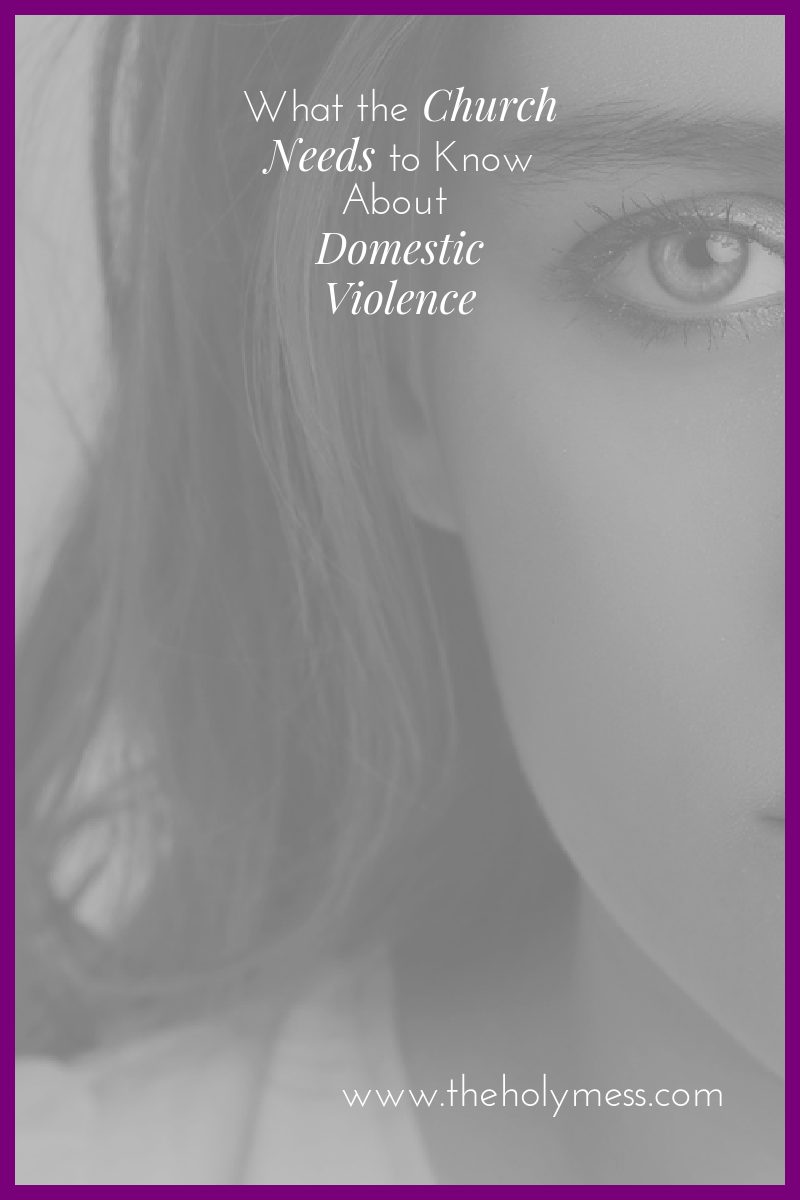Domestic violence is abusive behavior that takes place within families, often involving a spouse or partner. As churches, all too often we are silent about these behaviors, which further perpetuates dangerous and completely unacceptable cycles and beliefs. Please keep reading for important information about what the church needs to know about domestic violence.
This fall while writing my October 31-days series, Still Standing (which is about raising a child we adopted from foster care), I met Zenice Harasymchuk, who is the guest author of today’s post.
As soon as I read Zenice’s blog, I knew that I wanted her to write a piece for my website. Her experience is profound and provides unique insight into why this topic is so very important. Zenice is brave to speak out. Please give her words the careful attention they deserve.
For those of you who regularly attend church, I challenge you to read what Zenice says with an extra measure of care. We are called to minister in a way we often do not provide. Let’s commit to provide better awareness and understanding. We have an opportunity to provide help, hope, and light in a darkness.
What the Church Needs to Know About Domestic Violence
My name is Zenice and I am a survivor of domestic violence.
One of the things that I am called to do is to bring awareness to this tragic and growing epidemic. My audience consists mainly of the church, the Body of Christ, because we as the church are missing the opportunity to minister and bring hope to victims and survivors.
Many times there are people who sit in churches week after week and they sit in silent agony holding on to the pain of being abused, whether it be by their families when they were young or by their spouse who may or may not be sitting next to them. I implore you right now to educate yourself about domestic violence, what it is, how to recognize it, how to help, and how to share with others so they might not suffer in silence.
How Does Domestic Violence Happen?
Domestic violence holds a stigma because no one likes to get involved in other people’s relationships, and the victims find shame and blame from well-meaning people who don’t understand.
Consider this, you are madly in love with a man or woman and you come home one day from work to find yourself in an intense argument and then you end up being punched in the eye and called many awful names. How would you feel?
Remember this is the person you are madly in love with. This could be your boyfriend, girlfriend, husband or wife.
Now, in all reality this situation probably is not going to just happen like that. Most of the time an abuser is going to show toxic signs within the relationship along the way.
However, the saying “love is blind” tends to be true in these situations.
Why Does Someone Abuse His or Her Partner?
An abuser does not just wake up one day and decide to abuse their partner. There are many factors that can lead someone to be toxic in a relationship. He could have been abused in his childhood, he may have witnessed abuse, or he may have never seen a healthy relationship. She may have mental health issues or many other possible factors.
However, these are NEVER excuses to abuse another person.
What are the Warning Signs for Domestic Violence?
We all know that disagreements and arguments are a normal part of every relationship, but when does it get to the point where it becomes toxic?
Let’s look at some red flags that you can watch for when determining if you or someone you know is in an unhealthy, toxic and/or abusive relationship.
To help you remember these red flags, I’ve come up with an acronym for you – B.A.S.I.C.
B. Blame
– You made me do this, this is your fault.
A. Anger
– Overreactions to small problems, threatening/violent behavior to make the partner afraid
S. Sabotage
– Destroys their partners self-esteem, causes them to miss work/school.
I. Isolation & Intensity
– Insists on being with partner only and at all times, prevents partner from being with friends and family
– Behaviors intensify over time
– Obsessively calling, emailing or texting,
– Violence gets more extreme
– Verbal to physical
C. Control & Criticism
– Tells their partner what to do, makes decisions for them, checks up on them often
-Going through their belongings such as phone calls, texts, emails etc.
-Constantly putting the partner down, name-calling, claiming they are the only one that cares.
-Brainwashing to cause partner to feel worthless.
This list is not exhaustive but is meant to help you have an awareness of patterns and behaviors that are
common to abusive partners.
What Can the Church Do to Help Someone in an Abusive Relationship?
For starters we must understand that we cannot tell them what to do, or (and I know this might seem strange) try to rescue them.
Statistics show that it can take up to 7 times for a victim to leave her abuser.
The bottom line is the victim needs to make up her mind that she deserves more out of life. She needs to know that she can get away safely and move on in order to live a healthy life.
It becomes even more complicated when children are involved. Unfortunately, law enforcement and the court system still have a long way to go in the process helping victims. It is never an easy thing to leave someone you love especially when you potentially have to leave friends and family as well.
Here’s what we can do…we can believe the victim, pray, listen, encourage and provide resources.
I have a dream of seeing women who have survived abusive situations to rise up and share their stories and come alongside the women who are in abusive relationships now or trying to get out.
Jesus heals us from all of the effects that abuse can leave as long lasting scars on our lives whether it be depression, PTSD, suicidal thoughts, anxiety or isolation and fear. When someone who has been abused is able to get out of the relationship, they not only need the support of agencies. They need prayer, they need ministry, and they need inner healing.
Eye-Opening Statistics About Domestic Violence
Every 9 seconds in the US, a woman is assaulted or beaten.
1 in 3 women and 1 in 4 men have been victims of some form of physical violence by an intimate partner within their lifetime.
1 in 15 children are exposed to domestic violence each year, and 90% of these children are eyewitnesses to this violence.
There are so many types of abuse: child abuse, physical, emotional, mental, financial and sexual abuse, elder abuse, human trafficking and bullying.
We must not sweep these issues under the rug, especially in the church. We have the answer, and the answer is Jesus. We must be the hands and feet of Jesus to help victims and survivors find hope and peace for a life free from abuse.
There is absolutely no excuse for abuse and it is NEVER the victim’s fault. Let’s open up dialogue for these things to be talked about. Let’s find ways to assist others.
If you feel that you are in a toxic relationship, there are people who can help you. Talk to someone. Don’t suffer in silence. As we enter the holiday season, I am reminded of how difficult this time of year can be for those in abusive situations.
Find your local domestic violence shelter or agency and give something this holiday. Help those who are struggling to make sense of their lives and find peace.

Zenice Harasymchuk is the Founder and CEO of Beyond the Miry Clay Ministries, an organization dedicated to helping individuals affected by domestic violence. She is a lover of Jesus Christ. Her passions include prayer, studying the Bible, worship, taking pictures of God’s beautiful creation, and writing.
For more information about Zenice and her domestic violence ministry, visit her at BeyondtheMiryclay.org.
Resources:
Nationwide Resources
If you are concerned about the safety of your friend or family member, or to learn about services in your
area, contact the National Domestic Violence Hotline at 1-800-799-SAFE (7233) or TTY 1-800-787-3224.
National Domestic Violence Hotline
New York State Resources (Where Sara Lives)
New York State – Office of Children and Family Services
Niagara County Sheriff’s Office
Erie County Department of Social Services
Does your church provide awareness, services and support for those touched by domestic violence?

Grow Your Faith with Helpful Printables

*How to Do a House Blessing
*How to Use an Advent Wreath
*Bible Verse Cards
*more!







Awesome article. All I could think is that person would make a great candidate for a Stephens Minister. The ministry is no longer available at St Johns or St Pauls. I find this a real shame.
Stephen Ministry is a fabulous program!